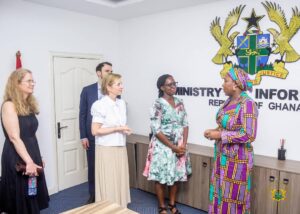Research finds 30% of electronic media collapses within six months of starting

The government has expressed its readiness to welcome financial support and capacity enhancement programmes from global organisations that desire to assist Ghanaian media houses.
A recent research published by the University of Ghana in April 2023 indicated that 30 per cent of electronic media houses in Ghana collapse within six months of their establishment due to financial constraints.
That was due to decline in advertising, competition from digital platforms, low public trust in the media because of media capture by politicians, and disinformation and misinformation, Madam Fatimatu Abubakar, the Information Minister-designate, said on Monday.
“Generally, there is so much struggle within the media space, therefore, media houses can do with some support,” she said.
Madam Abubakar, thus, expressed excitement over the soon to be opened African Regional Office of the International Fund for Public Interest Media (IFPIM) in Accra, to offer financial support to media outlets in the country.
The government had already provided an office space for IFPIM, which is undergoing renovation, and expected to be commissioned in a month’s time.
The official opening of the Office would enable media houses to apply for financial support from IFPIM to bolster their operations and ultimately enhance media freedom in Ghana.
Madam Fatimatu Abubakar made the disclosure when a high-powered delegation from the Deutsche Welle Academy, a German centre for international media development, journalism training and knowledge transfer, paid a courtesy call on her at the Ministry of Information in Accra.
The visit was to find out how Ghana is positioning her media space to deal with the growing global dynamics of artificial intelligence and capacity enhancement programmes for media practitioners.
According to the National Communications Authority, more than 700 registered radio stations exist in the country, of which 550 are active, with over 100 active television stations nationwide.
Madam Abubakar noted that the huge number of media outlets in the country made it difficult for them to sustain their operations and provide better staff remunerations.
She, however, highlighted some government’s interventions over the past two years to support media outlets.
The media capacity enhancement programme that provides training in media ethics and professionalism, coordinated programme on safety of journalists and the public campaign against misinformation and disinformation are among the interventions.
She mentioned a working committee comprising distinguished media professionals who select journalists for training and issue them certificates afterwards.
The beneficiaries were supposed to pass on the training to their colleagues in their respective organisations to promote professionalism in the media space.
Ms Natascha Schwanke, the Director of Media Development, Deutsche Welle Academy, and leader of the delegation, said the Academy received funding from the German Development Ministry and had been working to sustain and foster good information environment in their host nations.
Since its office was opened in Ghana in 2018, it had been working to enhance media information literacy and policy implementation projects with partner institutions.
Madam Ama Kodjo, the Programme Director, Deutsche Welle Academy, said it had been supporting investigative journalism through capacity building, supporting content creation and methodically training some media outlets in Ghana, citing the Fourth Estate as one of the beneficiaries.
The Academy also offered training in media information literacy for both media and their audiences to ensure quality dissemination of Information, and enhance proper analysis by the audiences to avert the spread of falsehoods.
Source: GNA
